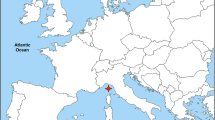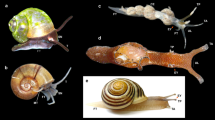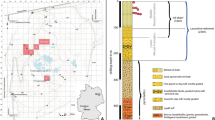Abstract
DESPITE the universal occurrence of the osphradium in the mantle cavity of marine Gastropoda and the large size to which it may attain, the current views as to its function are unsatisfactory. It has been considered (a) an organ for testing the water which enters the mantle cavity (Bernard1), and (b) as a chemo-receptor concerned with the detection of food in water (Henschel2, Brock3).
This is a preview of subscription content, access via your institution
Access options
Subscribe to this journal
Receive 51 print issues and online access
$199.00 per year
only $3.90 per issue
Buy this article
- Purchase on Springer Link
- Instant access to full article PDF
Prices may be subject to local taxes which are calculated during checkout
Similar content being viewed by others
References
Bernard, Ann. Sci. Nat. Zool., (7), 9, 250 (1890).
Henschel, Wiss. Meeresunters., Abt. Kiel., 21, 131 (1933).
Brock, Bibliotheca Zoologica, 92(1936).
Yonge, Sci. Rpts. G. Barrier Reef Exped., 1928–29, 1, 259 (1932).
Yonge, J. Mar. Biol. Assoc., 21, 687 (1937).
Orton, J. Mar. Biol. Assoc., 9, 444 (1912).
Stork, Arch. neérl. Zool., 1, 71 (1934).
Author information
Authors and Affiliations
Rights and permissions
About this article
Cite this article
HULBERT, G., YONGE, C. A Possible Function of the Osphradium in the Gastropoda. Nature 139, 840–841 (1937). https://doi.org/10.1038/139840b0
Issue Date:
DOI: https://doi.org/10.1038/139840b0
This article is cited by
-
Immunolabeled neuroactive substances in the osphradium of the pond snail Lymnaea stagnalis
Cell & Tissue Research (1994)
-
Ultrastructure of the osphradium of Aplysia californica
Cell and Tissue Research (1987)
-
Fine structure of some prosobranch ospharadia
Marine Biology (1973)
-
On the structure of the pulmonate osphradium
Zeitschrift f�r Zellforschung und Mikroskopische Anatomie (1971)
-
Central Nervous Responses to Chemical Stimulation of a Gastropod Osphradium
Nature (1963)
Comments
By submitting a comment you agree to abide by our Terms and Community Guidelines. If you find something abusive or that does not comply with our terms or guidelines please flag it as inappropriate.



